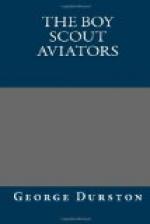“I think we’d have to stay over here, Dick. You see, my father is here on business, not just for pleasure. His company sent him over here, and it was understood he’d stay several years. I don’t think the war could make any difference.”
“That’s why you’re here, then, is it? I used to wonder why you went to school over here instead of in America.”
“Yes. My father and mother didn’t want me to be so far from them. So they brought me along. I was awfully sorry at first, but now it doesn’t seem so bad.”
“I should think not!” said Dick, indignantly. “I should think anyone would be mighty glad of a chance to come to school over here instead of in America! Why, you don’t even play cricket over there, I’ve been told!”
“No, but we play baseball,” said Harry, his eyes shining. “I really think I miss that more than anything else here in England. Cricket’s all right — if you can’t play baseball. It’s a good enough game.”
“You can play,” admitted Dick, rather grudgingly. “When you bowl, you’ve got some queer way of making the ball seem to bend —”
“I put a curve on it, that’s all!” said Harry, with a laugh. “If you’d ever played baseball, you’d understand that easily enough. See? You hold the ball like this — so that your fingers give it a spin as it leaves your hand.”
And he demonstrated for his English friend’s benefit the way the ball is held to produce an out-curve.
“Your bowlers here don’t seem to do that — though they do make the ball break after it hits the ground. But the way I manage it, you see, is to throw a ball that doesn’t hit the ground in front of the bat at all, but curves in. If you don’t hit at it, it will hit the stumps and bowl you out; if you do hit, you’re likely to send it straight up in the air, so that some fielder can catch it.”
“I see,” said Dick. “Well, I suppose it’s all right, but it doesn’t seem quite fair.”
Harry laughed, but didn’t try to explain the point further. He liked Dick immensely; Dick was the first friend he had made in England, and the best, so far. It was Dick who had tried to get him to join the Boy Scouts, and who had been immensely surprised to find that Harry was already a scout. Harry, indeed, had done two years of scouting in America; he had been one of the first members of a troop in his home town, and had won a number of merit badges. He was a first-class scout, and, had he stayed with his troop, would certainly have become a patrol leader. So he had had no trouble in getting admission to the patrol to which Dick belonged.
It had been hard for Harry, when his father’s business called him to England, to give up a all the friendships and associations of his boyhood. Had been hard to leave school; to tear up, by the roots, all the things that bound him to his home. But as a scout he had learned to be loyal and obedient. His parents had talked things over with him very frankly. They had understood just how hard it would be for him to go with them. But his father had made him see how necessary it was.




